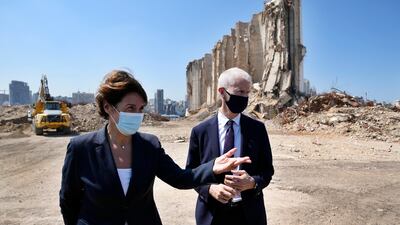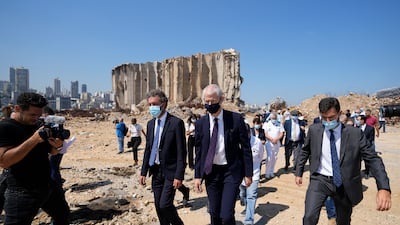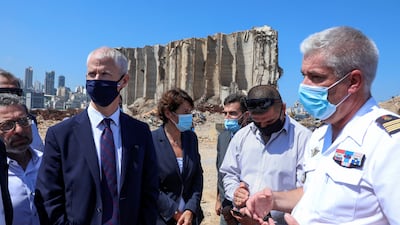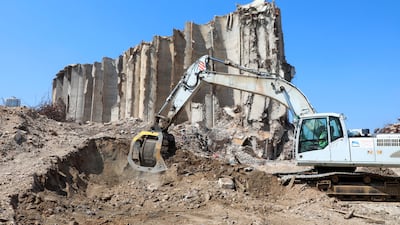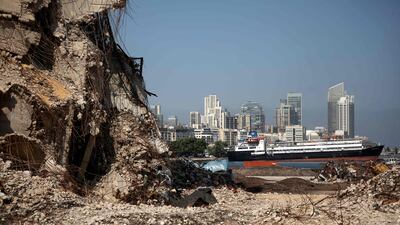France's Minister Delegate for Foreign Trade and Economic Attractiveness Franck Riester has said Lebanon faces a “real short-term humanitarian and health threat” if contractual terms to run a privately managed container terminal at Beirut port cannot be worked out soon.
Months of bureaucratic wrangling and fallout from the financial crisis that has rocked the country since 2019 have derailed efforts to finalise port management at a site severely damaged in an explosion in August 2020.
But Lebanese government officials have also been slow to act, Mr Riester said.
“Lebanese authorities must face their responsibilities,” Mr Riester said during a visit to the port silos on Tuesday morning, before a meeting with Lebanese President Michel Aoun.
The 15-year contract of British-Lebanese venture Beirut Container Terminal Consortium came to an end in January 2020. Its majority shareholder is British company Mersey Docks.
But the Lebanese government has not yet launched a public tender, which means the consortium’s contract is renewed automatically every three months, a port official previously told The National.
Mr Riester said “the container terminal is the gateway of raw materials, goods and all that the Lebanese need regarding imports".
"There is a threat, and I say it because it must be said, that the container terminal may stop working in the short term," he said.
member of the Beirut port administration's board
Mr Riester’s visit coincided with the official launch of a treatment project for the silos’ grain by French company Recygroup.
Nearly one year after a deadly blast rocked Beirut, between 20,000 and 30,000 tonnes of foul-smelling, insect-infested grain lies scattered around the giant silos.
Recygroup will remove and treat the grain over the next four months with the aim of safely recycling it for different purposes, including compost. The clean-up operation is being funded by the French government, which will pay 1.4 million euros ($1.7m) directly to the company.
Mr Riester said only five of the 16 cranes at the terminal were operational.
“Out of those five, many may stop working in a few days, a few weeks, or a few months. It is urgent that decisions be made and that a tender be launched," he said.
But a port official told The National in June that “six to eight” cranes were operational.
Port board member Christian Char said the consortium could not afford to fix cranes damaged by the blast because the company was paid in Lebanese pounds, which is now worth only a tenth of its official value owing to the country’s financial crisis.
Importers must be paid in US dollars, a currency that is scarce in Lebanon.
“They had a hangar full of spare parts and it’s gone now,” said Mr Char, in an apparent reference to the effects of the explosion.
“The port’s activity now is equivalent to one third of its activity two years ago."
The consortium did not immediately respond to a request for comment.
Mr Char said the port administration was prepared to launch a new tender at the end of consortium’s contract but that was blocked by caretaker Public Works and Transportation Minister Michel Najjar, who was appointed in January 2020.
Mr Najjar asked Lebanon’s central tender board to review the specifications, Mr Char said.
This is not a legal obligation but it went ahead “for the sake of transparency”, said Chadi Hussein, the Ministry of Public Works’ representative on the port administration’s board.
Director general of the central tender board, Jean Ellieh, told The National on Tuesday that he received a letter from head of the supreme council of customs Gen Assaad Toufeili six months ago asking for technical support regarding the tender.
“The exceptional circumstances in the country caused delays,” Mr Ellieh said, referring to the worsening economic crisis, which began months before the port explosion.
He did not receive terms of reference prepared by the port administration, he said.
“We asked for help from the EU and one of their experts handed us today his preliminary report,” he said.
“Technical requirements will be finalised within the next few days and then we’ll be able to launch the tender.”
